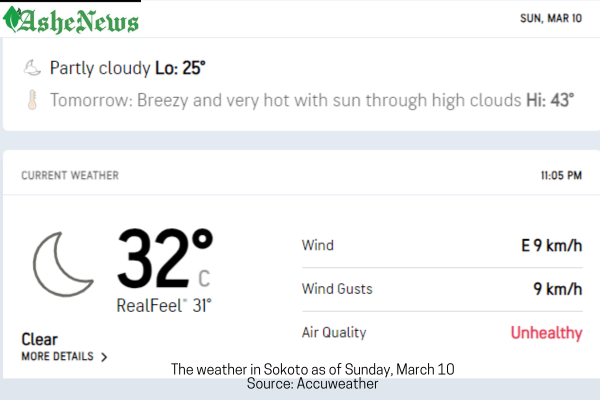There are worries about the harmful effects of the sun on the skin of children in Sokoto as the blistering sun in Sokoto State has become a formidable force, likened to the intense heat capable of boiling a tube of yam. From 10:00 am until 5:43 pm, the relentless rays of the sun spare no one, particularly students who are often found in schools when the sun is at its peak.
A student at Total Children’s School in Sokoto North, Andrew Emmanuel who shared his ordeal of the experience of the scorching sun with ASHENEWS, said he wakes up as early as 6 am to tackle chores amidst sweltering mornings.
He lamented the unavailability of electricity which increases the suffering of he and his siblings explaining that sleeping without electricity has been very traumatic to them. According to him, the heat from the sun makes the metal roof above his head turn their room into an oven.
To this end, he and his siblings are currently covered in heat-induced rashes.
The Nigeria Meteorological Agency (NiMet) had predicted prolonged heat waves across the country, with temperatures reaching 39°C in the South and 41°C in the North pointing that the northern part of the country will expect to experience more heat than the southern region.
Located in the extreme northwest of Nigeria, Sokoto experiences high temperatures, especially during the dry season. Its proximity to the Sahara Desert and its flat, arid terrain contribute to extreme heat conditions.
According to the NiMET Seasonal Climate Prediction, the heat wave is expected to be prolonged and will be with us for a while despite the rainfall. This development made the federal government issue a new advisory on how to cope with the prevailing heat wave in the country.
NiMet added that intense heat causes dehydration and could also cause fainting, chicken pox disease, measles, heat rash, weakness of the body, slight fever, dry lips, heat-related illnesses, respiratory issues, and increased vulnerability to chronic conditions.
Kebbi, Kano and Sokoto are among the hottest states in the country. In 2023, Sokoto state was predicted to be one of the states to exceed 40 degrees, according to the Nigerian Meteorological Agency (NiMET).
Musa Abdul, a student at Amirul Muminina Model College along Offa Road in Sokoto State, narrates a comparable tale. Despite his father’s shop initially offering relief from the morning sun, by 11:00 am, the heat in the shop becomes an unbearable furnace despite the installation of solar-powered fans.
Students like Musa endure lessons within the classroom with sweat-soaked bodies, fanning themselves with textbooks in a futile attempt to find relief of coolness.
The Centre for Disease Control and Prevention, in its article entitled “Extreme heat can impact our lives in many ways”, argues that the effects of extreme weather events can be dangerous to health and even fatal in some cases. These events may result in increased hospital admissions for heat-related illnesses, as well as cardiovascular and respiratory disorders.
In an interview with Punch Newspaper, a public health physician and Senior Lecturer at the Department of Community Health and Primary Care, College of Medicine, University of Lagos, Dr Doyin Ogunyemi said high temperature can have very deleterious effects on the human body.
“Apart from causing the temperature of the body to be high, extreme heat can cause exhaustion called heat exhaustion, and you can have people fainting and people that have underlying cardiovascular diseases can have a stroke, and other kinds of morbid conditions from the effects of heat.
“Excessive heat is worse in some age groups like children and older adults. The elderly are vulnerable, it can affect people who are of the extreme age groups and they can get very sweaty, and it can cause respiratory infections,” Ogunyemi said.
A recent graduate from a secondary school in Sokoto North, Juliet Moses is now employed at a hair salon and says it has been difficult to cope with the intense heat of the sun daily.
Juliet tries to stay hydrated by drinking lots of water but despite her efforts, the relentless heat leaves her constantly parched, seeking refuge from its scorching rays. Unlike during the harmattan season when water intake decreases, Juliet finds herself consuming more fluids to combat the intense heat.
In Sokoto State, where the sun’s vigour knows no bounds, even the simplest tasks become Herculean feats under its oppressive gaze. As concerns grow over its impact on children’s skin, communities are urged to take proactive measures to safeguard against its harsh effects.


